Search Results
‘Everything happens for a reason’: BART Police officer played semi-pro soccer before joining department
When Tyler Mauldin was three years old, her father handed her a basketball. Instead of dribbling it, she started kicking it. Her dad, who played basketball for Stanford University, realized he needed a new approach. He bought her a soccer ball and enrolled her in a recreational league. At 10, Mauldin began
Join us with your BART holiday sweater on 12/10/23 for SweaterFest '23

It's the most BARTable time of the year!
Celebrate our third year of the immensely popular BART holiday sweater at SweaterFest '23! Wear your BART holiday sweater from any year and join BART staff and fellow riders for a group photo at Rockridge Station on Sunday, December 10 from 2-3:30pm.
For riders who did not pre-order the 2023 BART holiday staff but would like to purchase one, staff will be selling the 2023 holiday sweater at SweaterFest '23. We will have contests, prizes, other BART merch for sale, music, and more to make it a true holiday event! Winners of our SweaterFest '23 Raffle can win exclusive BART prizes. (Raffle contestants must be present to win prizes)
Extra 2023 BART holiday sweaters will go on sale at railgoods.com after Thanksgiving.
For pre-orders who selected the pick-up option, your holiday sweater is available for pick-up at BART HQ, 2150 Webster Street in Oakland (walkable distance from 19th St Oakland Station) on weekdays from November 22 until December 7. The hours for pick-up are between 8:30am until 4pm. November 23 and November 24 will not be open due to Thanksgiving.
Starting December 11, pre-order pick-ups will be moved to the Customer Services Center at Lake Merritt Station on the concourse level.
Don’t be left out in the cold…grab your sweater and join us for a family-friendly, holiday-celebrating SweaterFest ’23!
We plan to introduce our new stamp rally passport at SweaterFest. If you attend the Meet the Anime Mascots event at Powell Street, be sure to bring your stamp from that event and we will add it to our passport.
BART PD earns highest level of accreditation from expert law enforcement panel
At its national conference the Commission on Accreditation for Law Enforcement Agencies (CALEA) reaffirmed the BART Police Department continues to meet the standard of the group’s Advanced Law Enforcement Accreditation. BART PD – which is in the process of filling 29 sworn officer vacancies this fiscal year - was already among the fewer than 6% of law enforcement agencies across the country that has earned accreditation from CALEA. This advanced accreditation places BART PD in an even smaller pool of departments and acknowledges the department’s commitment to following industry best practices, building community trust, and engaging in more than decade long commitment to reform.
“BART PD is working around the clock to ensure every rider feels safe from the moment they step into a station to the moment they arrive at their destination,” said interim BART PD Chief Kevin Franklin. “Our accreditation from CALEA wouldn’t be possible without the hard work of everyone in the department. Certification from CALEA is the gold standard for law enforcement. It shows the confidence of outside experts in the work being done by our department to continue improving, while ensuring we are keeping BART riders and workers safe across the Bay Area.”
BART PD first earned CALEA accreditation in 2019 and had to demonstrate at the conference the department has been meeting or exceeding CALEA’s standards. “We recognize that accreditation is a process, not a destination,” continued Franklin. “We are committed to continuing with the hard work to measure up to CALEA’s high standards as well as the demands of our riders who expect us to do everything we can to keep them safe every time they ride.”
BART PD earned its original CALEA accreditation as part of its more than decade long commitment to police reforms. The National Organization of Black Law Enforcement Executives (NOBLE) recommended in its final report issued in 2010 that BPD seek this accreditation. NOBLE conducted a top-to-bottom review of BPD after the tragic shooting death of Oscar Grant in 2009.
BART PD must prove compliance with nearly 400 standards annually as part of the Advanced Law Enforcement Accreditation Program. The comprehensive process included an on-site review by CALEA which focused on facility inspections, staff interviews, and gathering public input.
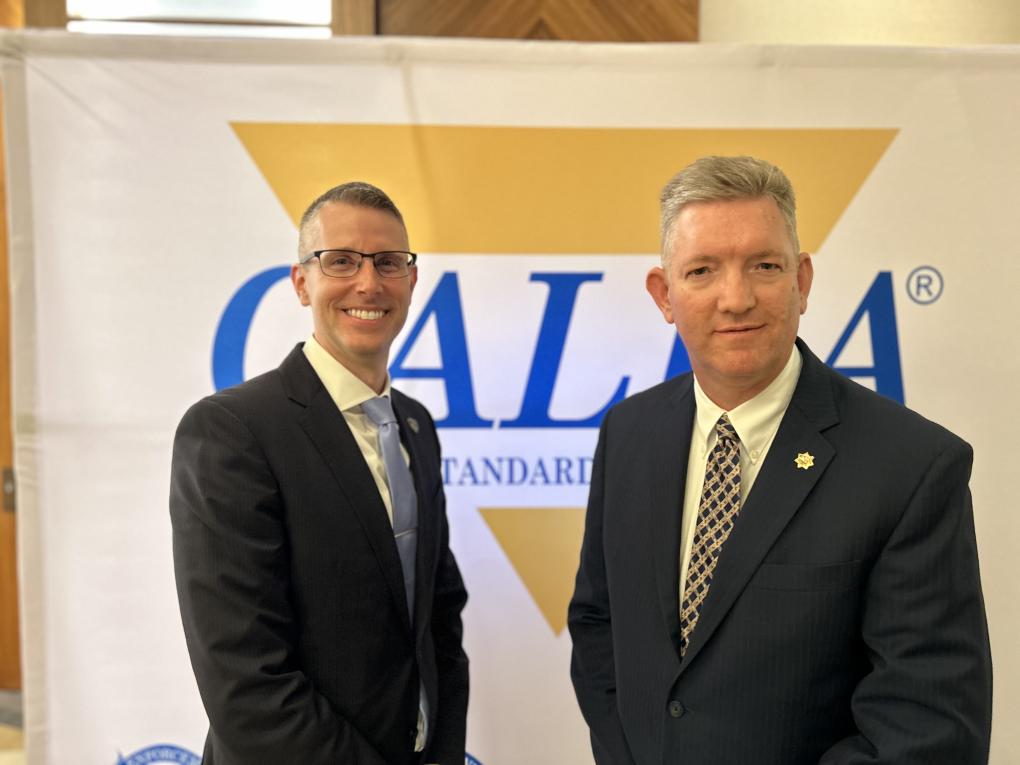
BART Board of Directors elects Bevan Dufty president and Mark Foley vice president
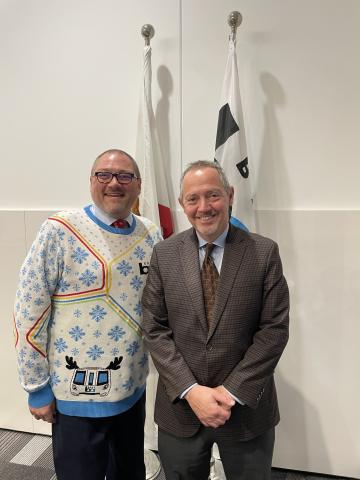
BART Director Bevan Dufty said he was “extremely hopeful” about the upcoming year following a vote today that elected him president of the BART Board. Dufty said he will work hard to support and collaborate with the BART team to solve problems and to anticipate the challenges ahead.
“I am so proud of the work this agency does to support the Bay Area community,” President Dufty said. “I look forward to working hand in hand with the rest of the Board in 2024.”
President Dufty was first elected to the BART Board of Directors in November 2016 and was re-elected in 2020. He represents District 9, which includes portions of San Francisco. Dufty served as president in 2019.
Director Mark Foley, who was elected vice president, said 2024 will be an exciting, but challenging year.
“There are a lot of great things happening at the agency we should celebrate,” Vice President Foley said. “People in the Bay Area love BART and what we do. We mean so much to people and provide a crucial lifeline for people traveling to school, to doctors’ appointments, and to work.”
Vice President Foley was first elected to the BART Board in November 2018 and was re-elected in 2022. Vice President Foley represents District 2, which includes Antioch, Brentwood, Concord (partial), and other cities and unincorporated communities in Contra Costa County.
Vice President Foley served as board president in 2021 and vice president in 2020 and 2022.
Watch Janice Li’s outgoing remarks as Board President, during which she highlights BART’s top accomplishments of 2023.
Measure RR supports community projects that will make it easier to walk and bike to and from BART
An innovative community partnership initiative that leverages BART capital funding to help local agencies make it easier for riders to safely walk and bike to BART stations is awarding funding to seven projects. The Measure RR Safe Routes to BART (SR2B) grant program’s third and final cycle will provide $16 million in funding for the projects, which are located across the three counties that make up the BART District (Alameda, Contra Costa, and San Francisco). The program is made possible through Measure RR which was approved by District voters in 2016 and provides $3.5 billion to rebuild BART’s core infrastructure to make the system safer and more reliable.
The selected projects are focused on improving bike and pedestrian connections to BART. SR2B makes the most of Measure RR dollars by using them to support projects that can offer a minimum funding match of 30% and can provide evidence of governing body support, a full funding plan, and a minimum of 35% design completion.
Here are the projects selected for Cycle 3 awards.
Project Safe Routes to BART funding
- Lakeside Dr/Lake Merritt Blvd. Complete Streets Paving Project $3 million
- Clement Avenue/Tilden Way: Broadway/Tilden Intersection $2.1 million
- Central Embarcadero Safety Projects $1 million
- Fremont Blvd. Elevated Bikeway $3 million
- Union City BART Pedestrian At-Grade Railroad Crossing $3 million
- Ohlone Greenway Modernization and Safety Project $3 million
- North Bailey Road Active Transportation Corridor Project $0.9 million
The projects awarded SR2B funding were selected from 16 applicants. Equity was a key factor in determining the award recipients. Applicants had to show how projects would improve active access for members of disadvantaged communities. Projects were also graded on readiness, leveraged funding, connectivity, rider experience, community desire, and other factors.
Projects now completed thanks to earlier rounds of SR2B funding include the 5th Street Improvement Project which enhances access to Powell Street Station in San Francisco and the Walnut/Liberty Protected Intersection Project which makes it easier and safer for riders to walk and bike to Fremont Station.
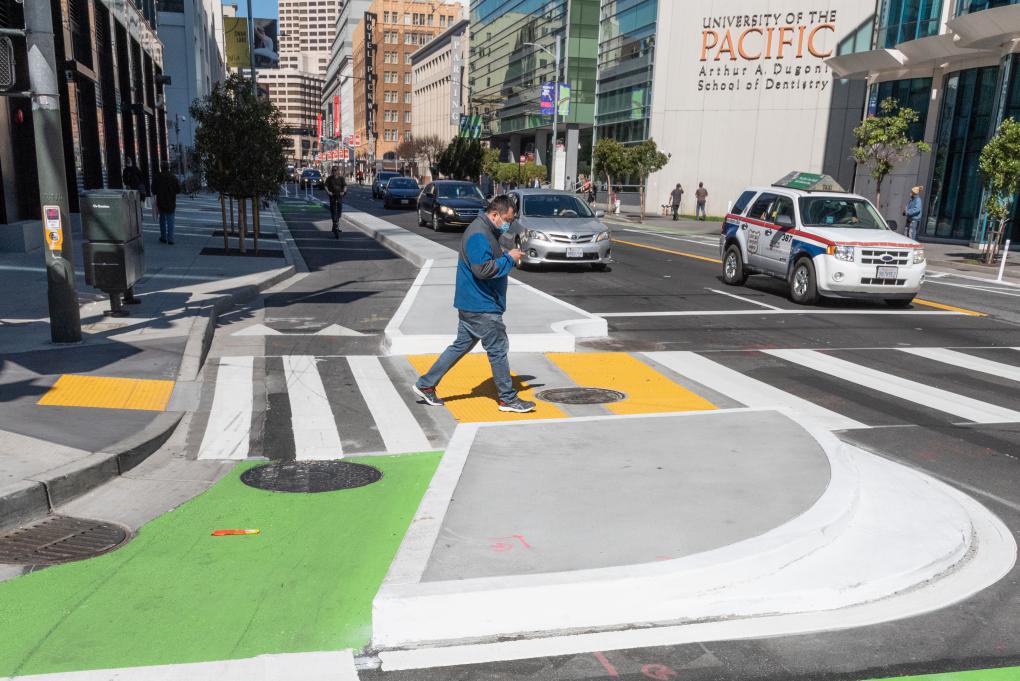
Take BART + Muni to Hardly Strictly at Golden Gate Park this weekend (10/4 - 10/6)
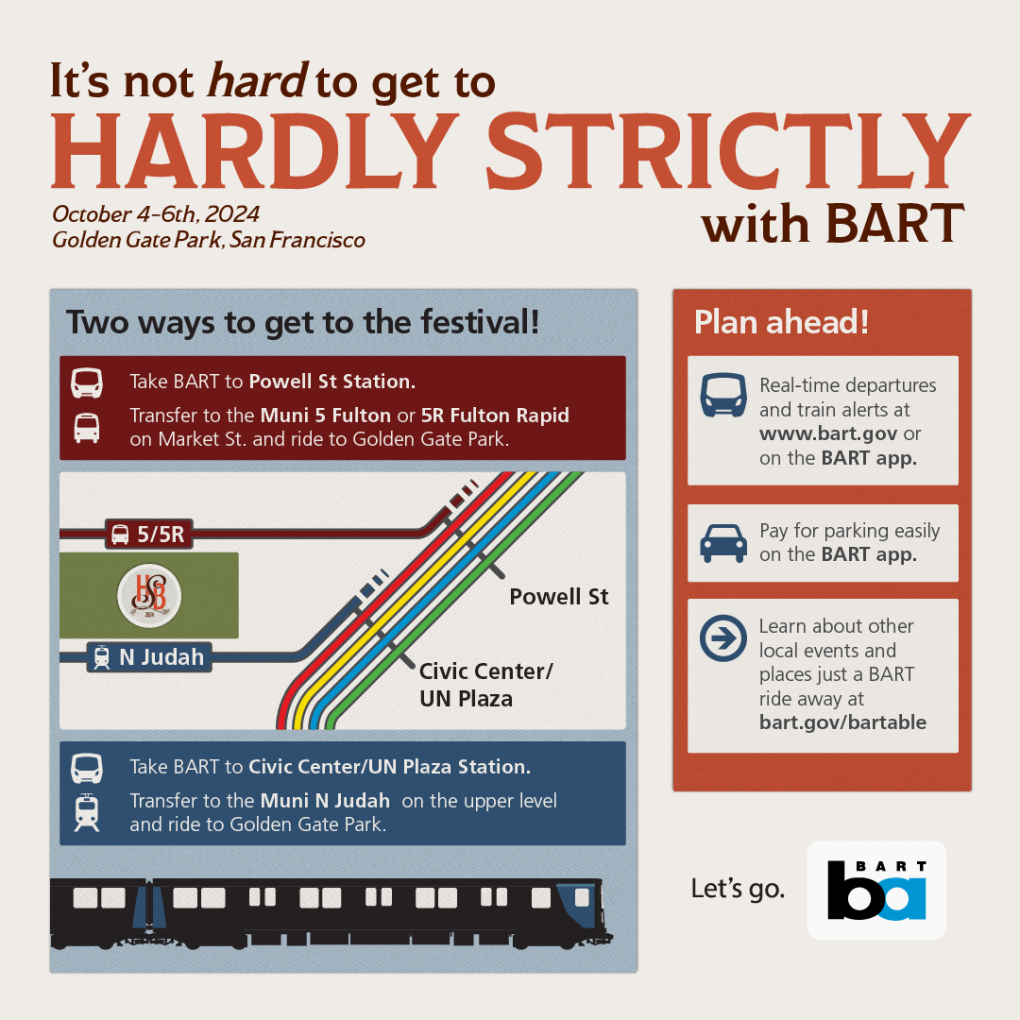
Heading to Hardly Strictly Bluegrass at Golden Gate Park this weekend? Public transit is your best bet.
BART riders heading to Hardly Strictly from the East Bay can take a train to Powell Station. Transfer to a Muni 5 Fulton bus or 5R Fulton Rapid on Market Street and ride to Golden Park.
BART riders coming up from San Mateo County or San Francisco can take a train to Civic Center Station and transfer to a Muni N Judah train on the upper level of the station. The N Judah train will run near Golden Gate Park on Irving and Judah Streets.
Rider Tips
Parking is free at all BART stations except Milpitas and Berryessa/North San Jose (which are operated by VTA) on Saturday, Oct. 5, and Sunday, Oct. 6. Pay for parking easily on the BART app.
Before you leave home, put Clipper card on your cellphone through either Apple Pay or Google Pay. Please ensure you have sufficient funds for a round trip. Plan at the cost of your trip in advance.
Real-time departures and train alerts can be found at bart.gov/eta or on the BART app.
Discover more fun events happening this weekend on BARTable.
BART Sound Tracks Jazz Festival coming to North Berkeley Station on Oct. 11
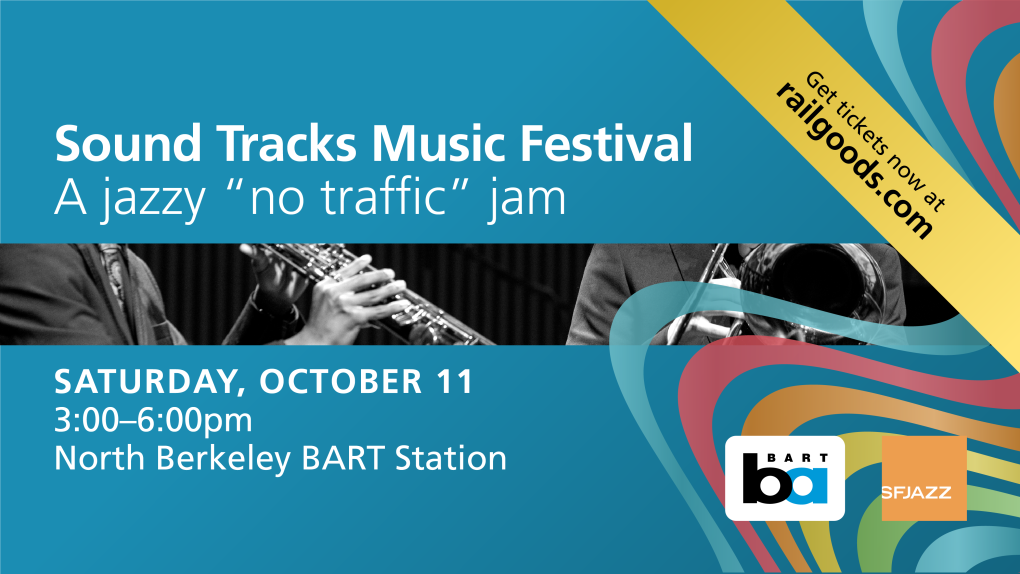
It’s a jazzy no-traffic jam!
Purchase advance tickets on Railgoods.com or on the day of the event.
This October, BART Sound Tracks returns with a one-day music festival featuring some of the Bay Area’s outstanding jazz and R&B talents.
Sound Tracks Jazz Festival, presented in partnership with SFJAZZ, will be held on Saturday, Oct. 11, from 3pm to 6pm, in the North Berkeley Station parking lot. In addition to three unique acts – SFJAZZ High School All-Stars, B DeVeaux, and Sun Hop Fat – there will be food trucks, mocktails, and BART merch for sale.
Now in its fourth year, BART has hosted Sound Tracks at stations as part of its event and rider engagement program, which celebrates transit, activates stations, uplifts local arts and culture, and demonstrates appreciation for our communities.
Purchase advance tickets or at the event on Railgoods.com. Attendees are encouraged to bring lawn/camping chairs, picnics, awesome hats and/or low umbrellas (consider your fellow eventgoers) and your dancing shoes. Consuming alcohol, smoking/vaping, and pets (service animals excepted) are not permitted at the event. There will be parking for motor vehicles and bicycles.
“It is thrilling to evolve Sound Tracks to a multi-artist event in partnership with longtime BARTable partner SFJAZZ,” said BART Art Program Manager Jennifer Easton. Arts and culture surround the BART system and creating an event that celebrates emerging and established local artists is a perfect opportunity to honor that and bring our community together for a great afternoon of music, dancing, and having fun.”
“SFJAZZ is very happy to extend our collaboration with BART and to curate the BART Sound Tracks Jazz Festival at North Berkeley BART station as part of our 'SFJAZZ presents’ activities across the Bay Area and beyond,” said SFJAZZ Director of Artistic Programming Burkhard Hopper. “SFJAZZ is all about bringing the best of jazz, legends, and newcomers alike to the Bay Area. We encourage our audience to use public transportations to come to this festival and our venue in Hayes Valley.”
Following the hugely successful Let’s Glow! Anime Festival in September and Under the Stars movie night in August, Sound Tracks will be another great opportunity to discover all the people, places and events accessible by BART as we land in Berkeley – a city known for its dynamic musicians and performance venues. BART and partner SFJAZZ, the largest nonprofit jazz presenter in the world, are bringing the focus on youth and the diversity of Bay Area music sounds that celebrate traditions and highlight innovators.
What: Sound Tracks Music Festival, presented by BART and SFJAZZ
When: Saturday, October 11, 3pm to 6pm
Where: North Berkeley BART Station parking lot, 1750 Sacramento Street, Berkeley, CA 94702
Tickets: $5 youth includes 1 youth drink (under 18), $10 adult includes 1 mocktail (18+), $24 family (2 adult + 2 youth). Youth under 5 are free. Tickets available for purchase at the event and on Railgoods.com now.
About the performers
The SFJAZZ High School All-Stars is a pre-professional training program for advanced musicians from the greater Bay Area. These young artists display a technical brilliance and musical maturity rarely seen in the youth ensemble arena. Each year the students perform, record, travel and participate in national festivals and competitions, and receive training and mentorship from leading jazz artists.
B DeVeaux is a 25-year-old Neo-Soul vocalist and songwriter, who has performed both as a solo artist and in other projects all over the Bay Area and beyond, including Yerba Buena Gardens, The Breakroom at San Jose Jazz, Hardly Strictly Bluegrass, the Mountain Winery, the Kennedy Center and most recently Outsidelands. They will make their SFJAZZ debut this season. Hailing from Oakland, CA, DeVeaux has been singing since the age of 3. They have just released their first album, CHRYSALIS.
Sun Hop Fat has been at the forefront of world music in the Bay Area. Their music blends the rhythms of traditional American funk and jazz with harmonies and melodies from East and West Africa. Drawing inspiration from the likes of Fèla Kuti, Mulatu Astake, and James Brown, and well steeped in the swampy sounds of New Orleans, their sounds include original compositions. This all-star band includes standout musicians from other popular San Francisco Bay Area groups including Afromassive, Harry and the Hitmen, and Smoked Out Soul.
Whether sit down jazz crowds or igniting the get-up-and-dance vibe, Sun Hop Fat’s wide appeal garners support from diverse audiences.
“…a steady wall of extraordinary moving sounds and beats” – San Francisco Examiner.
BART Board of Directors elects Mark Foley president and Melissa Hernandez vice president
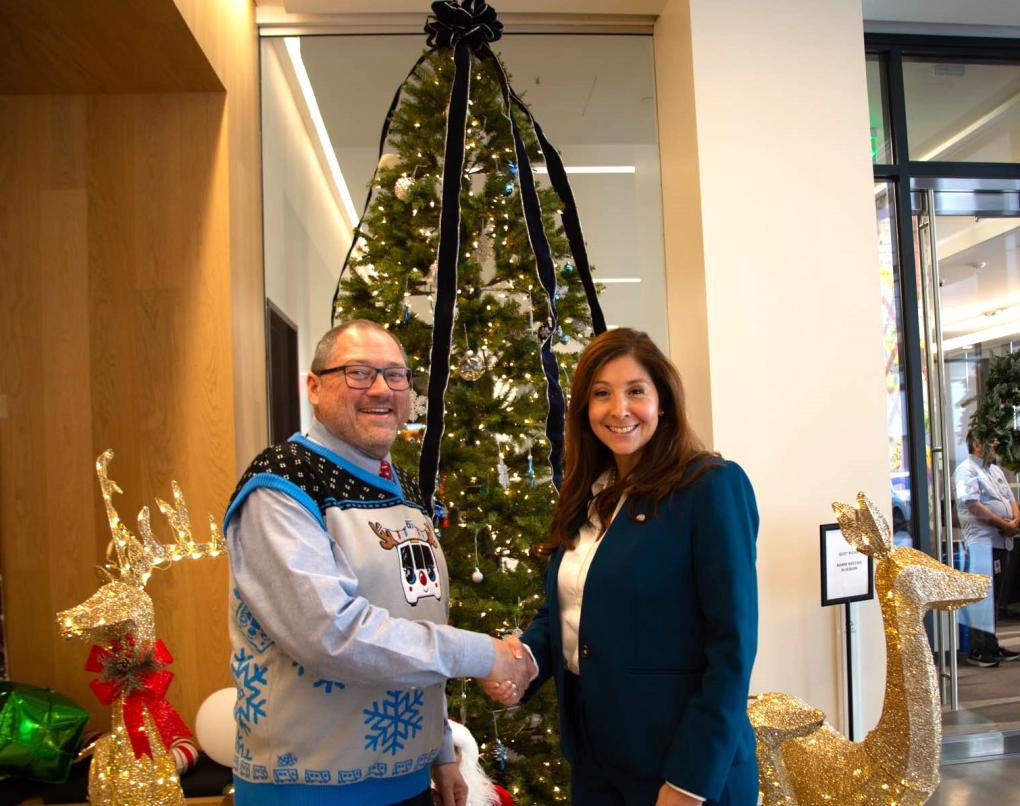
The BART Board of Directors unanimously elected Mark Foley to serve as its president for the 2025 term during its meeting today, December 19, 2024. Foley served as vice president for the 2024 board term.
Foley made a point to welcome the four new board members who took office for their first meeting. “Your fresh ideas, new perspectives, and diverse experiences are exactly what we need as we navigate the challenges and opportunities ahead,” Foley said. “I am confident that your contributions will be invaluable as we work together to shape the future of BART and public transit in our region.”
Foley will lead the BART Board during a time of unprecedented financial uncertainty. The Board of Directors and BART staff are seeking a reliable long-term funding source to replace federal and state emergency funds that are projected to run out in 2026. If unsuccessful, BART faces devastating cuts that will have serious impacts on the quality of life in the Bay Area.
“The work ahead requires deep collaboration, and I look forward to working closely with the Metropolitan Transportation Commission and our partners to develop a regional funding measure,” Foley said.
In his speech, Foley noted some exciting improvements expected in 2025, including the completion of the Next Generation Fare Gate Project, more reliable power for train service thanks to new electrical substations under construction, and progress on a new train control system to increase train frequency and reliability.
Foley was first elected to the BART Board on November 6, 2018, and was re-elected in 2022. Foley represents District 2, which is in Contra Costa County, and includes the City of Pittsburg, the City of Antioch, the City of Brentwood, the City of Oakley, the northeastern part of the City of Concord and the northern part of the City of Martinez, as well as the unincorporated communities of Mountain View and Vine Hill. District 2 BART stations include: Antioch, Concord (shared with District 1), North Concord/Martinez, Pittsburg/Bay Point, and Pittsburg Center.
Foley previously served as Board President in 2021 and as Board Vice President in 2020 and 2023.
Director Melissa Hernandez elected as BART Board Vice President
The Board of Directors also unanimously elected District 5 Director Melissa Hernandez as Board Vice President. She is the first Latina to serve on the BART Board of Directors.
First appointed to the Board on May 23, 2024, to fill the vacancy for District 5, Hernandez was elected in November.
District 5 is in Alameda and Contra Costa counties and includes a portion of the City of Hayward, ranging from Castro Valley Station in the north to Hayward Station in the south. It also includes the City of Pleasanton (except for a portion near Kilkare Woods), the City of Livermore, the City of Dublin, the southeastern part of San Ramon, and rural areas in east Alameda County.
Previously, Hernandez served as a City of Dublin councilmember for eight years and also served as the city’s mayor for four years until June 2024. She has chaired three regional transit boards: the Livermore-Amador Valley Transit Authority (LAVTA), Tri Valley/San Joaquin Valley Regional Transportation Authority (Valley Link), and the Finance Committee of the Alameda County Transportation Commission.
BART recruiting for Transit Security Advisory Committee (applications due 5/10/2024)
BART's Transit Security Advisory Committee (TSAC) is currently looking to fill several open positions and is accepting applications until May 10, 2024.
TSAC is the citizen and community oversight committee that works to ensure Assembly Bill 716 (Dickinson) -- which allows BART Police Officers the authority to issue prohibition orders to offenders who are cited or arrested for certain offenses -- is implemented as the Legislature intended. The oversight group, comprised of at least five citizens, serves as a volunteer review body for the implementation of BART’s prohibition policy.
Board-appointed members of TSAC are professionals in the areas of mental health, homelessness, public safety and youth advocacy and cultural awareness. Drawing from their private and public sector experiences, the committee brings a diverse set of skills to the review and execution of the prohibition policy. The advisory committee reports directly to the BART Board of Directors.
BART Transit Security Advisory Committee is currently looking for the following Open Seats:
- Two (2) Alternate Committee Member Seats (for any category, no more than one alternate per category)
- Law Enforcement Representative
- Mental Health Representative
- Public-at-Large Representative
- Youth Advocate Representative
- One (1) Law Enforcement Representative Seat
- Two (2) Public-at-Large Representative Seats
Final Filing Date – Applications are due by Friday, May 10, 2024, at 5:00 P.M. (PST)
Please download the application here and return the application form and relevant attachments to the BART Office of the District Secretary at:
2150 Webster Street, 10th Floor, Oakland, CA 94612
Applications may also be emailed to [email protected]
You may also submit your application using DocuSign by clicking on the following link: E-Application
Please feel free to call the Office of the District Secretary at (510) 464-6083 with any questions.